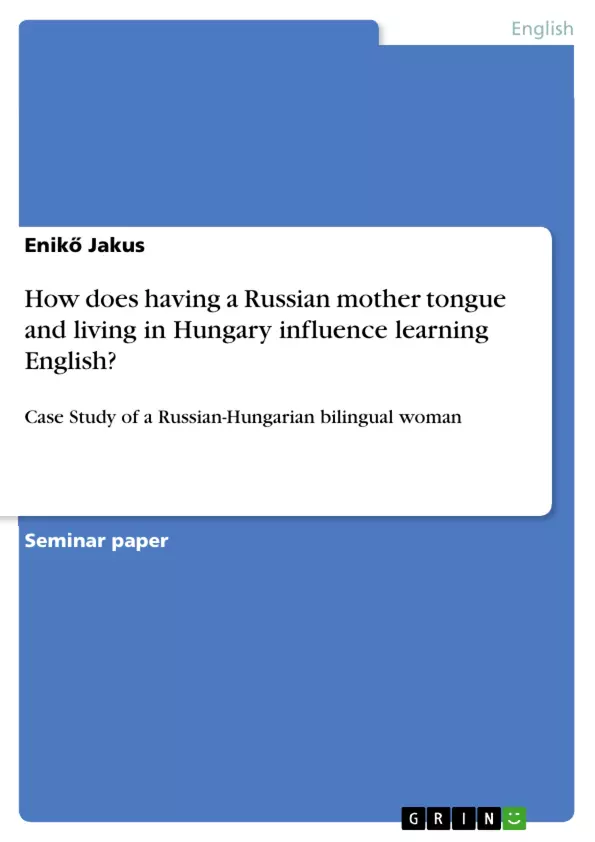Nowadays, in a globalized world where cross-cultural relationships are of key importance, multilingualism becomes more and more common, as well as families of mixed nations using more than one language. As a result of these, more and more children are growing up as bilingual or even as trilingual. It is interesting how these children can acquire two or more languages on a native-like level in their early childhood and how they learn foreign languages later at school. The aim of this paper is to explore this field using a case study of a Russian-Hungarian bilingual woman in Hungary. The purpose of the research is to find out what influences the bilingual background could have on the person’s foreign language learning, especially on learning English. The main question to be answered in this paper is: How does having a Russian-Hungarian mother tongue influence learning English? The hypothesized result is that the bilingual research participant experiences many positive factors because she already speaks two languages which is a cognitive advantage for her.
Inhaltsverzeichnis (Table of Contents)
- Introduction
- Methods
- Participant
- Instruments
- Data collection & analysis
- Results and discussion
Zielsetzung und Themenschwerpunkte (Objectives and Key Themes)
This paper investigates the influence of bilingualism, specifically having a Russian-Hungarian mother tongue, on learning English. It explores the experiences and perspectives of a bilingual woman named Szilvia, who grew up in Hungary after immigrating from Russia as a child.
- The impact of bilingualism on foreign language learning.
- The benefits and challenges of learning English as a foreign language.
- The role of personal experiences and motivation in language acquisition.
- The relationship between language learning and cognitive development.
- The influence of cultural background on language learning.
Zusammenfassung der Kapitel (Chapter Summaries)
The Introduction sets the context by discussing the increasing prevalence of multilingualism and the ongoing debate surrounding the effects of bilingualism on foreign language learning. The paper aims to explore this topic through a case study of a Russian-Hungarian bilingual woman.
The Methods section details the research methodology, including the participant selection, instruments used (interview and questionnaire), and data collection and analysis processes. The participant, Szilvia, is a 28-year-old woman who learned Hungarian as a second mother tongue after moving to Hungary as a child. She has been learning English since elementary school and has a strong motivation for further language development.
Schlüsselwörter (Keywords)
The primary focus of this research lies in the relationship between bilingualism, foreign language learning, and cognitive development. Key concepts explored include: bilingualism, foreign language acquisition, English language learning, language attitudes, motivation, cultural influences, and case studies.
Frequently Asked Questions
How does being a Russian-Hungarian bilingual affect learning English?
The research suggests that being bilingual provides cognitive advantages that can positively influence the acquisition of a third language like English.
What is the focus of the case study presented in this paper?
The study focuses on a 28-year-old woman named Szilvia, a Russian-Hungarian bilingual living in Hungary, to explore her foreign language learning experiences.
What are the main benefits of bilingualism in language learning?
Bilinguals often experience cognitive advantages and a better understanding of language structures, which helps in learning additional foreign languages.
What role does motivation play in Szilvia's English acquisition?
Motivation is a key factor; the participant has been learning English since elementary school and maintains a strong drive for further development.
What instruments were used for this research?
The research methodology included a qualitative interview and a questionnaire to gather data on the participant's language background and attitudes.
- Quote paper
- Enikő Jakus (Author), 2011, How does having a Russian mother tongue and living in Hungary influence learning English?, Munich, GRIN Verlag, https://www.grin.com/document/171740



